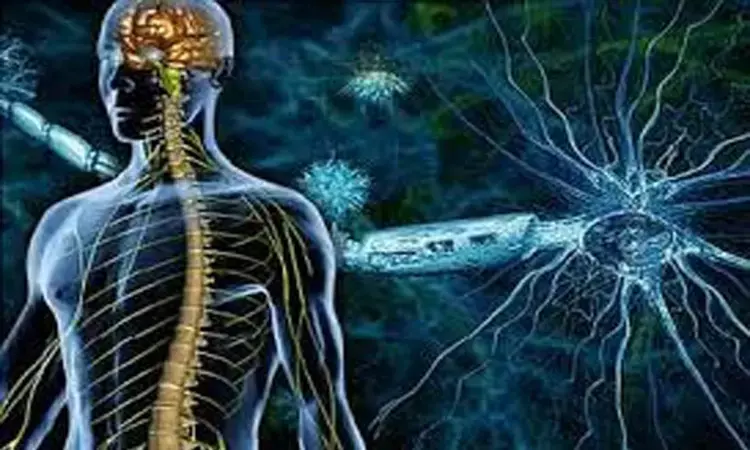- Home
- Medical news & Guidelines
- Anesthesiology
- Cardiology and CTVS
- Critical Care
- Dentistry
- Dermatology
- Diabetes and Endocrinology
- ENT
- Gastroenterology
- Medicine
- Nephrology
- Neurology
- Obstretics-Gynaecology
- Oncology
- Ophthalmology
- Orthopaedics
- Pediatrics-Neonatology
- Psychiatry
- Pulmonology
- Radiology
- Surgery
- Urology
- Laboratory Medicine
- Diet
- Nursing
- Paramedical
- Physiotherapy
- Health news
- Fact Check
- Bone Health Fact Check
- Brain Health Fact Check
- Cancer Related Fact Check
- Child Care Fact Check
- Dental and oral health fact check
- Diabetes and metabolic health fact check
- Diet and Nutrition Fact Check
- Eye and ENT Care Fact Check
- Fitness fact check
- Gut health fact check
- Heart health fact check
- Kidney health fact check
- Medical education fact check
- Men's health fact check
- Respiratory fact check
- Skin and hair care fact check
- Vaccine and Immunization fact check
- Women's health fact check
- AYUSH
- State News
- Andaman and Nicobar Islands
- Andhra Pradesh
- Arunachal Pradesh
- Assam
- Bihar
- Chandigarh
- Chattisgarh
- Dadra and Nagar Haveli
- Daman and Diu
- Delhi
- Goa
- Gujarat
- Haryana
- Himachal Pradesh
- Jammu & Kashmir
- Jharkhand
- Karnataka
- Kerala
- Ladakh
- Lakshadweep
- Madhya Pradesh
- Maharashtra
- Manipur
- Meghalaya
- Mizoram
- Nagaland
- Odisha
- Puducherry
- Punjab
- Rajasthan
- Sikkim
- Tamil Nadu
- Telangana
- Tripura
- Uttar Pradesh
- Uttrakhand
- West Bengal
- Medical Education
- Industry
New MRI technique can facilitate disability prediction in multiple sclerosis patients: Study

UK: Advanced MRI techniques can aid in detecting very early changes in the brain of patients with multiple sclerosis (MS) this may lead to more accurate predictions about the progression of the disease, a recent study has revealed.
The findings of the study published in the journal Brain may provide valuable insights into its pathophysiology.
MS is a long-term disease that can cause a range of symptoms, including vision problems, fatigue, pain, numbness, and motility problems. The disease is unpredictable and different for everyone and uncertainty of the condition's development -- both in terms of severity and symptoms -- is often a major cause of concern for the affected people. This uncertainty is also dependent on the fact that MRI which is the primary tool for diagnosing and follow up of MS patients can only see a small part of the complex MS damage that occurs.
Sara Collorone, University College London, London, UK, and colleagues used multi-parametric quantitative MRI to detect alterations in brain tissues of patients with their first demyelinating episode. The researchers acquired neurite orientation dispersion and density imaging [to investigate morphology of neurites (dendrites and axons)] and 23Na MRI (to estimate total sodium concentration, a reflection of underlying changes in metabolic function).
The researchers enrolled 42 patients diagnosed with clinically isolated syndrome or multiple sclerosis within 3 months of their first demyelinating event and 16 healthy controls. Physical and cognitive scales were assessed. At 3 T acquired brain and spinal cord structural scans, and neurite orientation dispersion and density imaging were acquired. Thirty-two patients and 13 healthy controls also underwent brain 23Na MRI.
Neurite density and orientation dispersion indices and total sodium concentration in brain normal-appearing white matter, white matter lesions, and grey matter were measured.
Key findings of the study include:
- Patients showed higher orientation dispersion index in normal-appearing white matter, including the corpus callosum, where they also showed lower neurite density index and higher total sodium concentration, compared with healthy controls.
- In grey matter, compared with healthy controls, patients demonstrated: lower orientation dispersion index in frontal, parietal and temporal cortices; lower neurite density index in parietal, temporal and occipital cortices; and higher total sodium concentration in limbic and frontal cortices.
- Brain volumes did not differ between patients and controls.
- In patients, higher orientation dispersion index in corpus callosum was associated with worse performance on timed walk test, independent of brain and lesion volumes.
- Higher total sodium concentration in left frontal middle gyrus was associated with higher disability on Expanded Disability Status Scale (rs = 0.5).
- Increased axonal dispersion was found in normal-appearing white matter, particularly corpus callosum, where there was also axonal degeneration and total sodium accumulation.
- The association between increased axonal dispersion in the corpus callosum and worse walking performance implies that morphological and metabolic alterations in this structure could mechanistically contribute to disability in multiple sclerosis.
"As brain volumes were neither altered nor related to disability in patients, our findings suggest that these two advanced MRI techniques are more sensitive at detecting clinically relevant pathology in early multiple sclerosis," concluded the authors.
Reference:
The study titled, "Brain microstructural and metabolic alterations detected in vivo at onset of the first demyelinating event," is published in the journal Brain.
DOI: https://academic.oup.com/brain/advance-article-abstract/doi/10.1093/brain/awab043/6246099
Dr Kamal Kant Kohli-MBBS, DTCD- a chest specialist with more than 30 years of practice and a flair for writing clinical articles, Dr Kamal Kant Kohli joined Medical Dialogues as a Chief Editor of Medical News. Besides writing articles, as an editor, he proofreads and verifies all the medical content published on Medical Dialogues including those coming from journals, studies,medical conferences,guidelines etc. Email: drkohli@medicaldialogues.in. Contact no. 011-43720751


